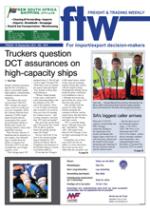Protectionist pressures that
will impact the flow of freight
around the world are building
once again as the world
economy struggles to recover
from the recession, warns
World Trade Organisation
(WTO) director general Pascal
Lamy.
Speaking at a meeting of
the CUTS Geneva Resource
Centre in Delhi recently, he
said WTO monitoring had
found that the expected rise
in protectionism in order
to protect jobs and local
businesses hit by the 2008
recession had not materialised.
“The situation was kept
under control and it remained
that way throughout 2010. But,
over the past six months, we
have spotted some worrying
developments,” he said.
Protectionism would also
change the nature of global
trade as it has evolved.
“The geographical
fragmentation of the value
chain is leading to a structural
change in international trade,
moving from the old theory of
‘trade in goods’ to a new ‘trade
in tasks’ paradigm.”
As a result, the existing
systems for measuring trade no
longer tell the full story:
“Defining and conducting
trade policy in this context
calls for a new measurement
of trade flows based on value
added, which will indicate the
domestic content of exports
after subtracting direct and
indirect imported inputs,” he
says.
Global value chains also
require “taking a closer look
behind border rules and
regulations. As tariffs are
gradually reduced, divergences
in domestic regulatory
frameworks require greater
attention”.
A “proliferation” of
“complex” preferential
trade agreements is also
posing challenges for freight
forwarders and customs
clearing houses.
“The 2011 WTO World
Trade Report which we have
just published shows that, while
there is slow convergence on
tariffs, the risk of divergences
in regulatory frameworks in
preferential trade agreements is
growing,” he says.
Other “global challenges”
which fall outside of the ambit
of the WTO include “the
blurring of the edges between
trade policy and others.
Exchange rate policies, climate
change policies, food security
policies or energy policies will
require the attention of WTO
members.
“The same can be said of
the expansion of the WTO
Government Procurement
Agreement.
“Or the unfinished task
of integrating the world’s
poorest countries fully into the
global economy in a far more
convincing way than is the
case at present,” he said.
Protectionist pressures building as global economy falters
16 Sep 2011 - by Ed Richardson
0 Comments
FTW - 16 Sep 11

16 Sep 2011
16 Sep 2011
16 Sep 2011
16 Sep 2011
16 Sep 2011
16 Sep 2011
16 Sep 2011
16 Sep 2011
16 Sep 2011
16 Sep 2011
Border Beat
Poll
Featured Jobs
New
